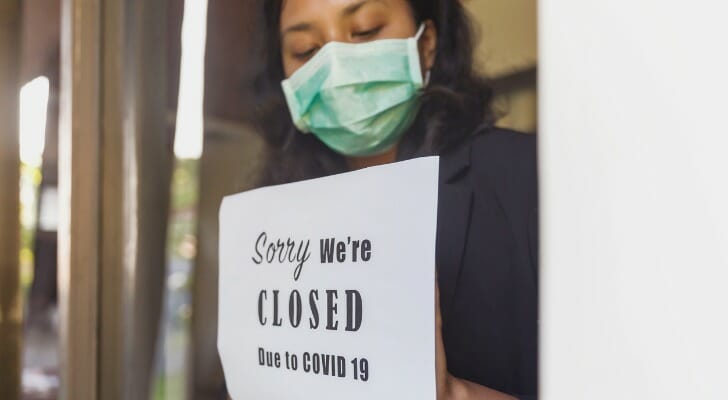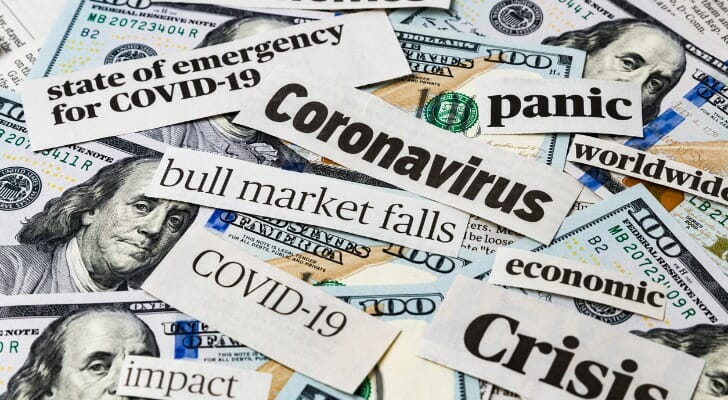Maine provides several coronavirus relief options for its individuals and small businesses. As the state works to recovery its economy, it has introduced numerous expansions and programs to support those severely impacted by the pandemic. Among these are unemployment benefits expansions, financial grants and various other programs. But employees and small business owners may also benefit from federal relief efforts. In this guide, we explore your options for relief both at the state and federal levels.
A financial advisor can help you protect your assets during turbulent times. Find a financial advisor today.
Maine Coronavirus Relief for Individuals
Unemployment Benefits
Maine now offers expanded unemployment benefits to individuals who’ve lost their jobs due to coronavirus-related reasons. The state removes the one-week waiting period for unemployment benefits, allowing you to receive your compensation immediately. In addition, you won’t have to fulfill the normal work search requirement.
Financial Authority of Maine (FAME) COVID-19 Relief Consumer Loan Program
The COVID-19 Relief Consumer Loan Program works with Maine banks and credit unions to provide to no- to low interest loans of up to $5,000 any unemployment benefits received by the borrower, according to FAME.
The loans apply to any self-employed Maine residents who have experienced a coronavirus-induced reduction in income since January 1, 2020. See how to apply here.
Maine Coronavirus Relief for Small Businesses

Financial Authority of Maine COVID-19 Business Direct Loan Program
Small businesses can receive loans of up to $50,000 with special terms if they can prove they’ve suffered coronavirus-related financial loss. In order to qualify, small businesses must be experiencing business interruption or hardship due to COVID-19, and they must demonstrate that they’ve exhausted all other sources of capital, according to FAME.
The program comes with 12-month loan terms, which may be extended. However, special terms are only available to businesses that submit applications on or after March 20, 2020. Learn more about eligibility and loan details here.
COVID-19 Relief Interim SBA Finance Loan Program
Your small business may also be eligible for FAME Direct Loans of up to $100,000 if you prove commitment to SBA financing. Eligible businesses will be Maine-based and have proof of commitment to SBA financing. And borrowers must also have the intention to use the FAME loan until the SBA loan is funded. The SBA loan would pay off the FAME loan, according to FAME. See how to apply here.
Small Business Advising
Maine Small Business Development Centers (SBDC) offers free, confidential business advising for any Maine small businesses in need of assistance. Some of the areas of focus included business planning, business startups, financial analysis, credit and financing, operations and more. You can request advising here.
Federal Coronavirus Relief for Individuals
The Coronavirus Aid, Relief and Economic Security (CARES) Act includes several key provisions to help support individuals who’ve been negatively impacted by the coronavirus. Among these are enhanced coronavirus unemployment benefits and paid coronavirus sick leave and family leave. For unemployment, those filing unemployment claims can now receive an additional 13 weeks of benefits, plus a federal boost of $600 per week if they’ve lost their job due to COVID-19 reasons. You can also take advantage of sick and family leave if you’re either diagnosed with COVID-19, or you’re caring for a dependent or household member who has been affected by the virus.
The coronavirus stimulus package also distributes direct cash payments to all Americans with certain adjusted gross incomes (AGIs). The coronavirus stimulus checks go out to individuals, married couples and heads of household. Individuals with an AGI of $75,000 or less qualify for a maximum rebate of $1,200, while heads of household earn $1,200 if they make $112,500 or less. However, married couples qualify for a maximum of $2,400 (plus $500 per dependent) if they make $150,000 or less. And the check amounts phase out at $5 for every $100 the filer makes above the income threshold. So individuals earn nothing if they make $99,000 or above. The income cut-offs for couples and heads of household are $198,000 and $136,500, respectively.
Other forms of relief enacted in the stimulus package include coronavirus relief for rent and mortgage payments, tax deadline extensions and coronavirus student loan relief programs.
Federal Coronavirus Relief for Small Businesses

The CARES Act also focuses on coronavirus relief for businesses. Though out of funding, one of the most significant relief programs for small businesses was the Small Business Administration’s Paycheck Protection Program (PPP). The $349 billion fund offered businesses 2.5 times its average monthly payroll costs (excluding salaries of $100,000 or more) up to $10 million. Interested small businesses would need to apply through a PPP loan lender. The initial fund was dried up within a few weeks, but $310 billion more was recently added to the program.
One program that’s currently available is the SBA Debt Relief Program. This fund provides six months of relief to those with current SBA 7(a) loans, 504 loans and microloans. The SBA will also pay principal, interest and fees of new loans issued before September 27, 2020. Learn more about the program here.
Coronavirus-impacted small businesses should also consider options such as Community Advantage loans, express loans and SBA 7(a) loans. Economic Injury Disaster Loans (EIDLs) offered businesses emergency cash advances of $10,000, plus loans up to $2 million. While not currently available, the EIDL program may receive additional funding.
The Bottom Line
Maine provides several different relief programs for individuals and small businesses economically affected by the coronavirus pandemic. And if you’re facing financial hardship due to the virus, you can also utilize coronavirus crisis government help through various federal programs. But the eligibility requirements vary for each form of relief, so you’ll want to make sure you’re familiar with those before you apply for assistance.
Tips for Managing Your Finances During the Coronavirus Crisis
- Financial advisors can help you protect your finances while navigating times of economic hardship. If you’re having trouble finding one in your area, our free financial advisor matching tool can help. The tool asks you to complete a short questionnaire about your financial situation, and then it matches you with up to three local advisors.
- A large number of companies are also offering support to those impacted by coronavirus. For instance, Google pledged $800 million to coronavirus relief. See a complete list of companies helping coronavirus-impacted people here.
- Not sure how much you’ll receive for your stimulus check? Our coronavirus stimulus check calculator can help.
Photo credit: ©iStock.com/PromesaArtStudio, ©iStock.com/Kanawa_Studio, ©iStock.com/JJ Gouin
